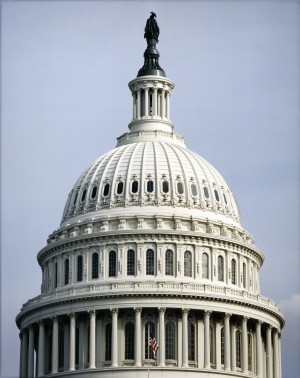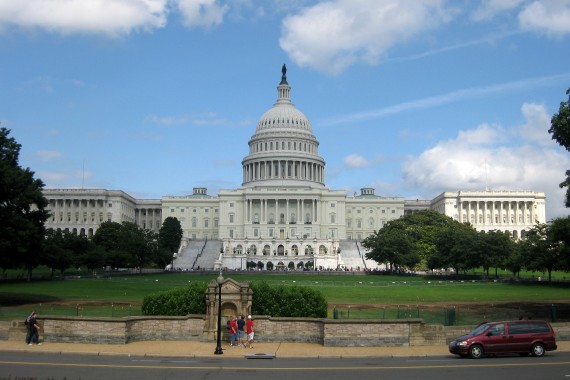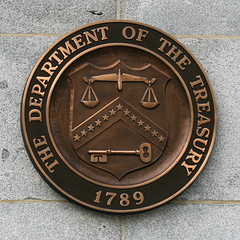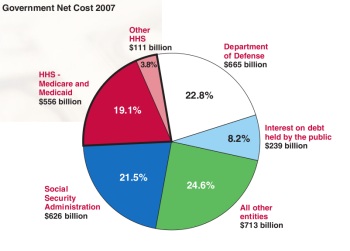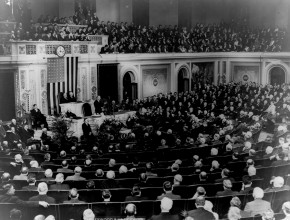
President Hoover addresses joint session of Congress at bicentennial ceremony commemorating the 200th anniversary of the birth of George Washington.
My guest writer today is my uncle Paul.
Notion of Consensus
Today’s conventional wisdom touts consensus as the ideal for a congress or legislators to seek. However, conventional wisdom isn’t always right or wise, nor is consensus necessarily a noble goal. Consider this:
Consensus means average. Do you want our ambitions to be just average? In addition, the authors of our Constitution constructed Federal law as a system of checks and balances on government — not as a consensus building document. Our founder’s design for legislating dictated that concepts are to be brought before the separate chambers of Congress where discussion about elements described in bills occurs.
After receiving the bills, Congressional members make their most persuasive arguments for or against the bill. After all members that want to have had their say, the vote for supremacy follows. Based upon the vote, the bill is either accepted or rejected by the Congress. The agreed upon bills are referred to the President for his concurrence and signature before succeeding to become law.
No Requirement for Consensus
The foregoing is a simplification of the process but illustrates that there is no requirement for consensus at all. Attempting consensus connotes horse trading which leads to corruption. In the vernacular the products are called earmarks among other appellations.
Slavishly striving for consensus as a goal rather than good government is an aberration of Constitutional intent. Poor law deserves no confirmation. Why would a legislator agree to bad law for the sake of being recognized as one who grants concessions searching for affability, or worse — corruption? If there is merit to the bill and enough voting members are sufficiently convinced, then the bill becomes law. Otherwise the bill is rejected and good riddance. Compromise rather than rewriting the bill or rejecting it leads to bad law. Further, the collusion of legislators who engage in passing laws strictly to appropriate funds for special interests whom they are dependent upon for campaign contributions is an abomination on the noble act of making laws for a free people.
A Shoddy Rationalization for Corruption
“Bringing home the bacon” is a popular misconception about governing. What if the bacon isn’t needed and who pays for the bacon? For example, what is the public good of forcing the Armed Services to accept weapons systems because some legislator is skillful at under the table deals? Who can justify taking money from a struggling family and giving it to someone for purchasing services we don’t need? It follows the “bacon” is a shoddy rationalization for corruption. Thankfully that notion is being challenged by the Tea Parties. Moreover, our Constitution doesn’t require compromise or dirty dealing to pass laws. Law making simply requires a vote. Our Constitution is not designed to make passing laws easy. Passing bad law is supposed to be hard to do.
Experience show us that Legislators are conditioned to fear being labeled an obstructionist if they don’t compromise. My experience is that if one takes a principled stand he loses some votes and gains others. Then there is the oily legislator that refuses to take any stand fearing voters on both sides of the proposition. Where is the dignity arising from being mendacious?
Collision Between Parties
Where has consensus gotten us? Consensus got us into a national debt for one thing. After the Republican drubbing during the 2008 election, all the talk afterwards was that Republicans needed to be more like Democrats if they were to regain power — that is a false premise.
Getting along, loosely tabulated, since 1939, is what kept Republicans in the minority for thirty years. Republicans have held both houses of Congress only 14 years while Democrats count 68 years.
Best government depends upon Collision between parties. Without collision, we suffer collusion. On a collusive basis, why have parties at all? We don’t all agree about everything nor should a vibrant nation be a Johnny-one-note. Parties help us to avoid open civil warfare.
Photo Credit: Library of Congress
